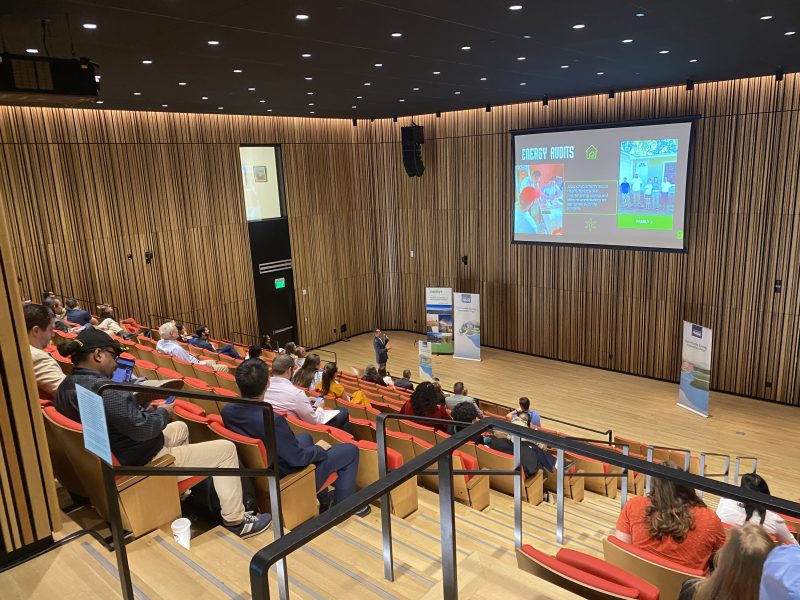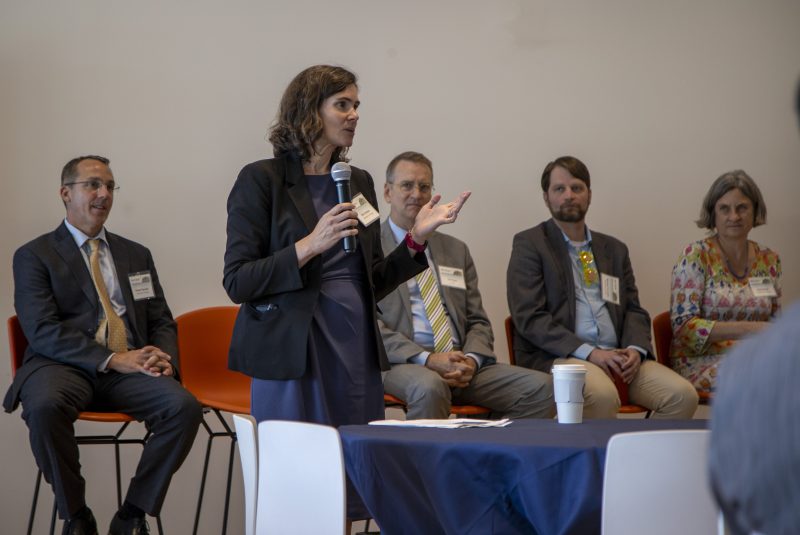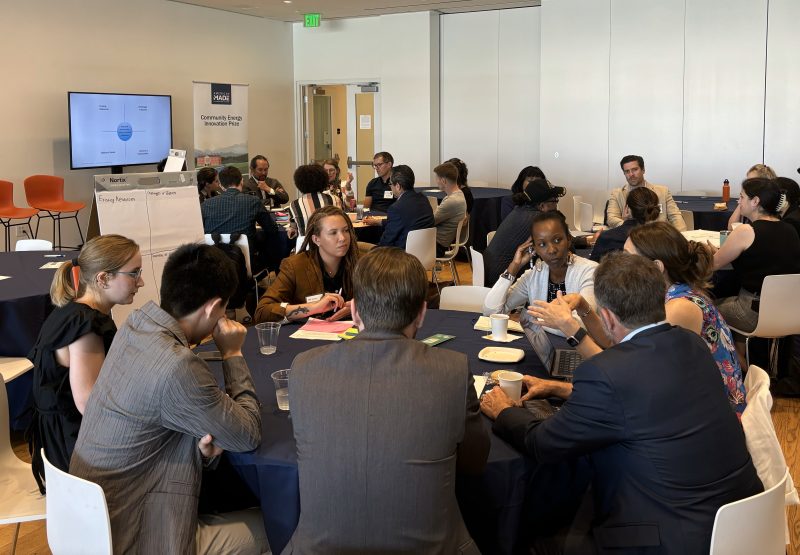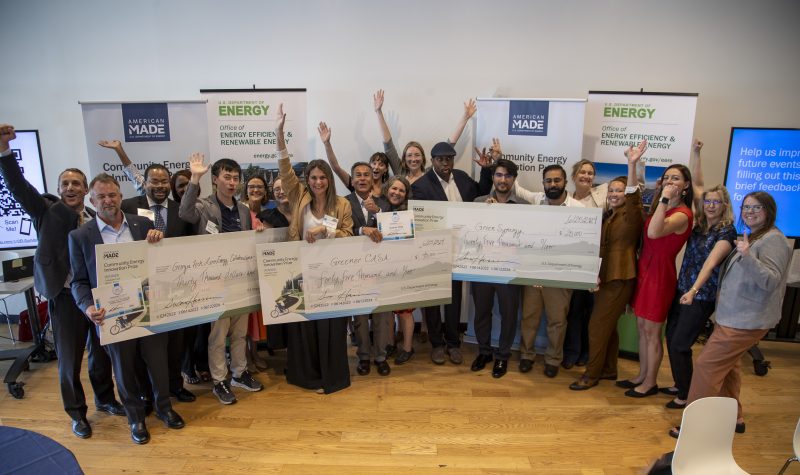Blog | Federal Investment
March 6, 2025
July 1, 2024 | Awa Darboe and Allie Judge
On June 25, 2024, the Clean Energy Business Network (CEBN) hosted the Community Energy Innovation (CEI) Summit on behalf of the U.S. Department of Energy. Taking place at the Martin Luther King Jr. Memorial Library in Washington, D.C., the summit showcased the three winning teams of the Collegiate Track of the Community Energy Innovation Prize and provided support to teams from the Clean Energy and Manufacturing Ecosystem Tracks, along with other organizations working to create an equitable clean energy transition. This event was made possible through sponsorship by E2, the Clean Energy for America Education Fund, Climate Power, NRDC, and National Wildlife Federation.
For further information, view the full slide deck for the event and read the Department of Energy’s press release about the winning Collegiate Track teams.
To kick off the event, CEBN President Lynn Abramson gave an overview of resources available from the DOE’s Office of Energy Efficiency and Renewable Energy (EERE), the American-Made Challenges, and the Community Energy Innovation Prize—including free resources available to competitors via the Power Connectors (CEBN, ADL Ventures, yet2, and Energy Futures Network).
This was followed by remarks from Sarah Mason, Deputy Executive Director of the Clean Energy for America Education Fund, who emphasized the value of amplifying the stories of communities working to advance clean energy initiatives, and Jeff Marootian, Principal Deputy Assistant Secretary of EERE, who discussed the importance of funding equitable, community-driven clean energy projects at EERE.
The centerpiece of the summit featured pitches from three teams that had won the first two phases of the Collegiate Track of the Community Energy Innovation Prize. Each of these teams is engaged in carrying out programs to boost clean energy in their respective communities. Pitches served as an opportunity to showcase their work, highlight the results to date, receive feedback from judges and audience members, and compete for a final round of cash prizes.
Georgia Tech Zero Energy Collaborations, based in Atlanta, GA, focused on designing and building a net-zero home to address energy challenges, develop a green workforce, and train the next generation of sustainable professionals in Westside Atlanta.

Greener CASA, based in Tyler, TX, worked to build an academia-community partnership to bring free energy audits to underserved communities to promote energy efficiency.
GreenSynergy, based in Houston, TX, established fully functioning solar power hybrid stations in underserved communities to enhance clean energy access and education with their community college partner.
In the course of their work, each of these teams successfully built a collaboration between academic and community-based partners. They each had a well-thought-out plan and learned to pivot to changing demands and unexpected challenges.
To learn more about each Collegiate Track team, please check out the individual team posters here.
Following the pitches, attendees had the opportunity to network and discuss the morning’s presentations over lunch provided by DC Central Kitchen. This nationally recognized community kitchen provides hands-on culinary job training for individuals facing high barriers to employment while creating living wage jobs and bringing nutritious, dignified food where it is most needed.
The goal of the afternoon’s federal funding workshops was to provide an overview of funding, tax credits, and technical assistance programs at several DOE offices and at the Environmental Protection Agency (EPA) that are specifically oriented for community-based organizations, local government, and other stakeholder groups. The workshops kicked off with short presentations from each speaker, followed by audience Q&A enabling audience members to learn more about these programs.

The workshop highlighted the unprecedented opportunities presented by the Justice40 Initiative, Bipartisan Infrastructure Law, and Inflation Reduction Act to address historic inequities in the energy ecosystem. However, a significant point of discussion included the need for more funding to flow directly to community organizations and to improve informational resources and access to that funding.
Links to key resources discussed by the panelists are provided below:
Diana Bauer, Deputy Director, Advanced Materials and Manufacturing Technologies Office, DOE
Elke Hodson, Deputy Director for Technology Policy, Office of Policy, DOE
Ted Toon, Senior Advisor, Greenhouse Gas Reduction Fund, EPA
Lauren Ross, Deputy Director for Energy Justice, Office of Energy Justice and Equity, DOE
Michael Forrester, Assistant Director of Partnerships, Office of State and Community Energy Programs, DOE
Moderator: Rob Sandoli, Deputy Director of the Integrated Strategies Office, Office of Energy Efficiency and Renewable Energy, DOE
Presentations for each speaker can be viewed here.

To close out the afternoon programming, participants engaged in roundtable discussions on key considerations for building an inclusive clean energy economy. These small group discussions facilitated knowledge and resource-sharing, group ideation, and collaboration among prize teams, federal government officials, community organizations, industry representatives, policy advocates, and other stakeholders. Roundtable moderators kicked off the discussions by prompting participants to consider their individual needs, access to resources, challenges or barriers, and solutions or opportunities to help accomplish their individual goals. This initial brainstorming helped set the stage for discussion around opportunities and challenges to ensuring a just energy transition and deploying equitable clean energy initiatives.
The event concluded with an award ceremony, in which Susan Hamm, Director for Integrated Strategies at EERE, announced the Collegiate Track Grand Prize winners and the award amounts:

The Community Energy Innovation Summit underscored the importance of collaboration and community engagement in tackling climate change and deploying clean energy. A central theme throughout the day was that intentional outreach and technical assistance are essential to ensure federal clean energy and climate funds reach those most in need.
The Summit served as a vital platform for CEI Prize teams and other changemakers across the public and private sectors to share knowledge and experiences, fostering a sense of enthusiasm and commitment to advancing a just and equitable clean energy transition.
Stay tuned for a second Summit in December, featuring pitches by the winning Manufacturing and Clean Energy Ecosystem Track teams, along with additional stakeholder workshops. Please contact Lynn Abramson to learn about opportunities to sponsor or provide other forms of support on this event.
____
Stay engaged in opportunities for furthering an inclusive clean energy economy by completing CEBN’s JEDI Interest Form. Also check out our U.S. Cleantech Funding Database and Cleantech Ecosystem Resources List for additional sources of support.
____
Photos by Taylor Mankle, National Renewable Energy Laboratory. View more images from the Summit here.